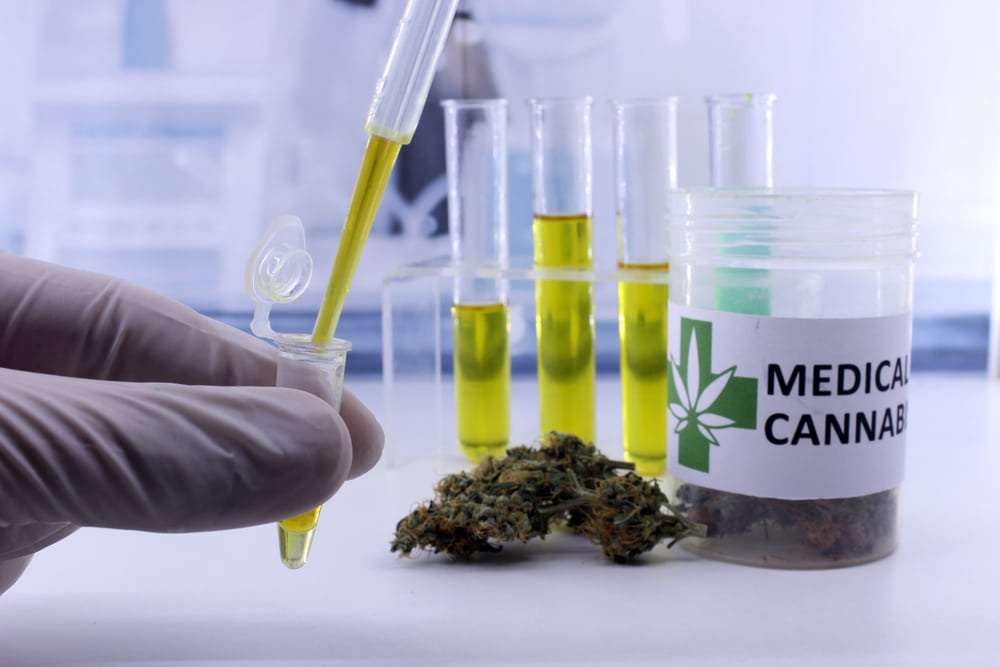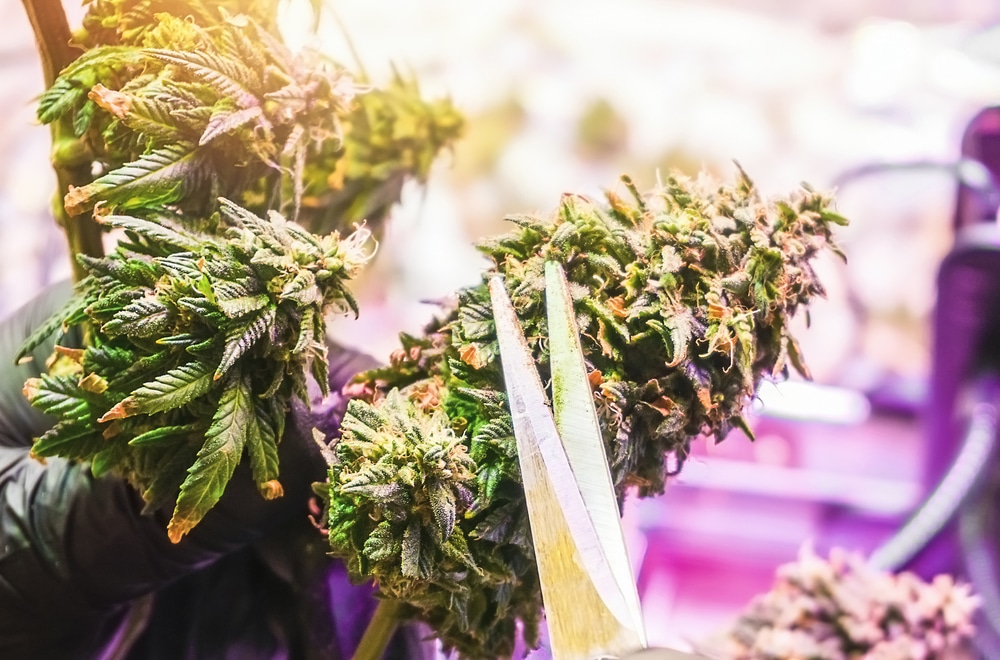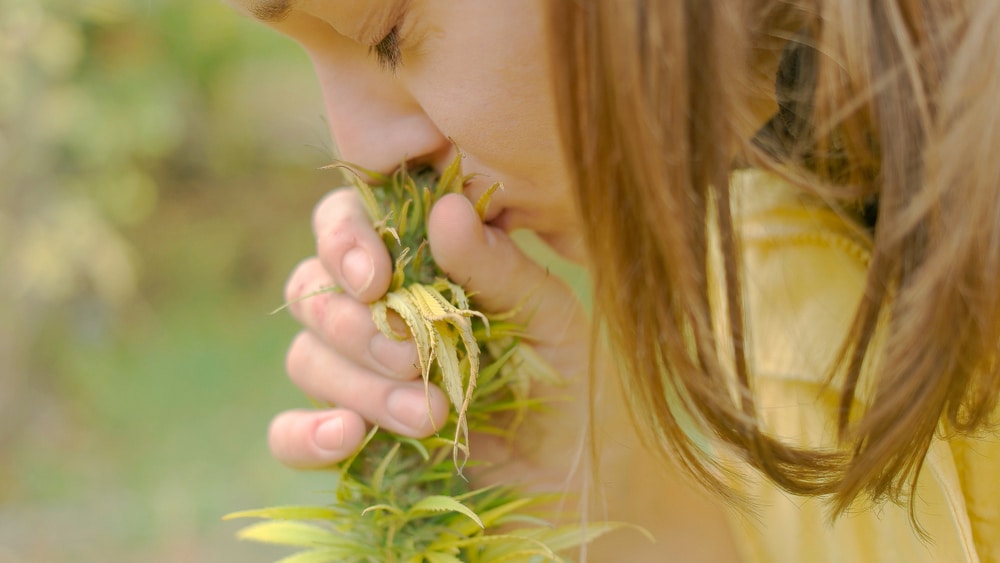No products in the cart.
Marijuana Education
Is It Safe to Combine Weed and Melatonin?
Are you looking for natural ways to improve your sleep quality? Melatonin and weed are among the top solutions for a good night’s doze.
While most people use marijuana for recreational purposes, the herb also carries potential medical benefits. According to health experts, marijuana may help increase melatonin production in your body.
How does that help insomniacs get a better night’s rest? The hormone plays a major role in regulating your sleeping pattern.
Some supplements can boost the process if your body struggles to produce melatonin. Can you take them while consuming cannabis?
Keep reading to discover whether combining weed and melatonin is safe and potent enough to improve sleep quality.
What is melatonin and how does it work?

Melatonin is a natural hormone your body produces through the pineal gland in the brain. Its main function is to regulate your sleep/wake pattern. It also plays a role in modulating blood pressure.
Norepinephrine, which acts as a neurotransmitter and hormone, regulates the release and synthesis of melatonin in the pineal gland. This natural chemical also plays a part in controlling your sleep/wake cycle.
Before discussing the results of mixing melatonin and weed, let’s see how this natural hormone works in the body.
Your body’s built-in sandman
Melatonin regulates your circadian rhythm, an internal clock signifying when to wake up or sleep.
The brain produces this hormone in high amounts in the evening and night, making you feel drowsy. As morning approaches, the pineal gland releases less melatonin, helping you become alert and eventually wake up.
Exposing your eyes to light at night may affect the production of this hormone, altering your circadian rhythm. Other factors that can cause low melatonin levels include aging, alcohol consumption, certain medications, and shift work.
How does it function? This hormone interacts with various melatonin receptors, including M1 and M2. The former promotes sleep, while the latter controls your internal clock in response to the natural light/dark cycle.
Relief for light sleepers and insomniacs alike
Do you have trouble falling or staying asleep? Your body might have low melatonin levels, making achieving a good night’s doze challenging.
Melatonin and weed may help with these conditions by boosting hormone production and controlling the circadian rhythm.
They also might be useful to people who undergo jet lag after traveling across different time zones. This condition occurs when your circadian rhythm doesn’t align with the new area, causing temporary sleeping difficulty.
Melatonin may also assist shift workers who find it challenging to fall asleep, since they perform duties at night. It can help you achieve a deep slumber lasting several hours during the day.
The hormone may assist people who have trouble dozing off and waking up. According to various studies, consuming melatonin before bed can reduce sleep latency or the time it takes to fall asleep.
The supplement may decrease the duration by about three minutes and increase the resting period by half an hour. It can also minimize sleep disturbances and boost the overall quality of your slumber.
As you age, your body slows down natural melatonin production, leading to difficulty achieving high-quality sleep. Taking supplements can assist you in dozing off faster and maintaining the slumber for longer.
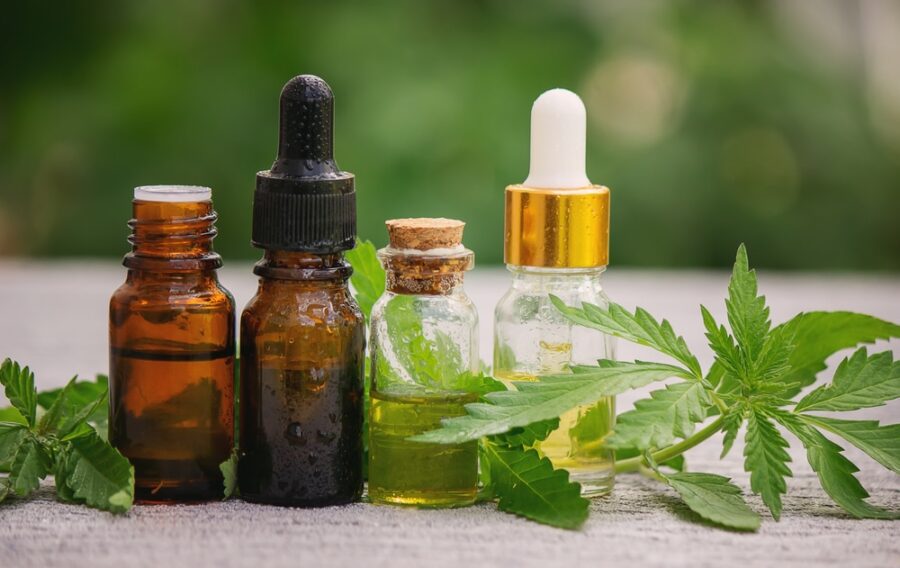
What are the side effects of melatonin?
Whether taking melatonin and weed or alone, the dietary supplement may have some side effects. Though the Food and Drug Administration (FDA) doesn’t approve it, most medical professionals consider it safe for human consumption.
Various studies suggest the supplement contains no toxic substances and doesn’t cause addiction. Taking melatonin daily for prolonged periods may be safe for most users.
Little evidence supports the notion that taking the supplement may affect the body’s natural hormone production.
Though it’s generally safe, some users report mild side effects after consuming melatonin supplements. These include:
- Dizziness
- Grogginess
- Headache
- Daytime sleepiness
- Fatigue
- Nausea
The supplement may interact with other medications, reducing their effectiveness or causing adverse reactions. These drugs include:
- Blood pressure medication
- Oral contraceptives
- Blood thinners
- Diabetes medication
- Sedatives or sleep aids
- Antidepressants
- Anticonvulsants
If you’ve got an underlying health issue or take such medications, it’s advisable to seek medical advice. Your doctor can guide you on the recommended dose to avoid the risk of side effects.
Taking high amounts of melatonin may promote sleepiness in some users or cause adverse reactions in others. Side effects of overdosing on this supplement may include:
- Upset stomach
- Headache
- Anxiety
- Diarrhea
- Irritability
- Joint pains
Large quantities of melatonin can also increase the risk of high blood pressure, especially in people with the condition.
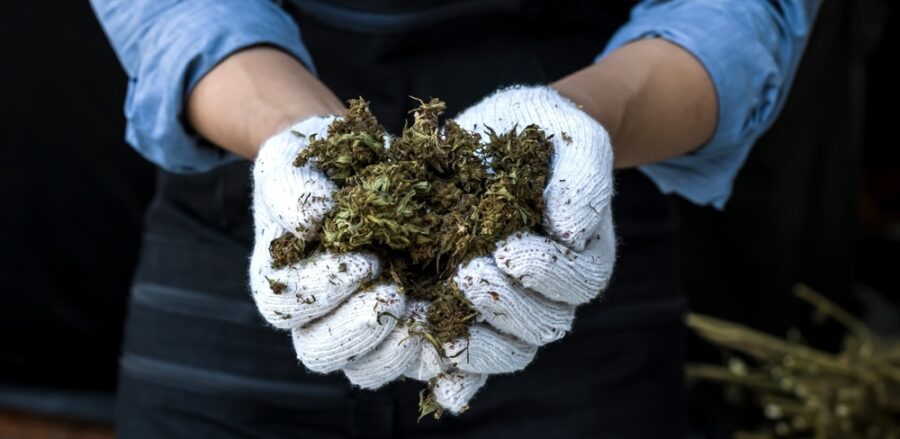
How to use melatonin responsibly
Melatonin and weed are safe, depending on your usage. Stick to the right dosage to reap the supplement’s benefits without experiencing adverse reactions.
If you’re a beginner, start taking small amounts and gradually increasing until you achieve the right dosage. The recommended quantity is 0.5–1 gram for novice users and 3–5 grams for experienced consumers.
Take melatonin one or two hours before bedtime and avoid consuming more than five grams. It’s advisable to follow the guidelines the supplement outlines or seek advice from your doctor.
The right dosage may vary with users, depending on age and the intended purpose of the dietary supplement. Those with insomnia may need less than adults with jet lag or shift workers.
While taking melatonin, it’s best to avoid drinking alcohol since it reduces its effectiveness. It may also lead to side effects, including rapid heartbeat, poor sleep, and increased anxiety.
How cannabis could help you sleep
Before mixing weed and melatonin, it’s important to understand their working mechanism. The former interacts with the endocannabinoid system (ECS), which is responsible for various actions, including sleep.
Despite limited research, cannabis users report the herb can help reduce insomnia. The main compounds in marijuana, cannabidiol (CBD) and tetrahydrocannabinol (THC), are responsible for the effects.
Cannabis may help you relax and induce sleep when you take minimal amounts. The herb’s effectiveness may vary depending on the strain and consumption method. Most people prefer smoking, while others use edibles or tinctures.
THC, the main psychoactive compound in marijuana, delivers a calming and sedative effect that promotes sleep. It can also help you doze off quicker and stay in a deep slumber longer.
CBD mainly interacts with the ECS and has potential health benefits like pain reduction, which can promote better sleep.
What does the research say about weed and sleep?
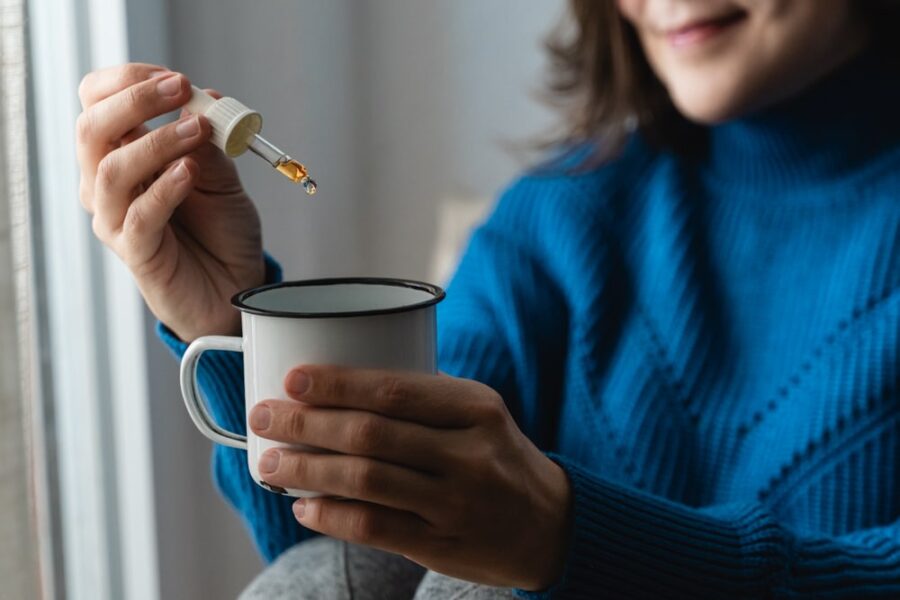
Cannabis can potentially help people with various sleep disorders, including restless leg syndrome, insomnia, and obstructive sleep apnea (OSA). Users report that cannabis reduces the symptoms of these conditions, but there’s limited research to support the claims.
A 2008 study suggests that consuming weed with high THC levels reduces rapid eye movement (REM) in sleep. The depletion means the user experiences fewer dreams and deeper slumber.
Less REM sleep can benefit people who have nightmares or disturbed rest associated with post-traumatic stress disorder (PTSD).
CBD may increase alertness in low quantities, but taking higher doses typically causes sedation. Though weed might benefit insomniacs, excessive consumption may alter the sleep cycle and cause side effects.
Why cannabis could make you sleepy
Weed and melatonin mixed together may help you doze off faster and enjoy a deep slumber. But how does weed make you feel sleepy?
Though CBD and THC in marijuana interact with the body differently, they both promote sleepiness. It’s advisable to consume marijuana about one hour before bedtime to reap the sedating effects.
Start with minimal amounts, whether smoking, vaping, or taking edibles, until you determine the correct dosage. Take note of the strain that delivers your desired effects, since each cultivar has unique benefits.
Here are a few reasons why cannabis could help you sleep:
- Users report CBD may reduce stress, anxiety, and depression, all of which make it hard to fall asleep. If you’re free of these conditions, achieving a peaceful doze is easier.
- Taking low amounts of marijuana may boost serotonin production, a neurotransmitter that regulates moods. The herb may promote a calming and relaxing sensation, soothing your body to fall asleep.
- Studies and reports show CBD may reduce inflammation and chronic or acute pain. If you experience less soreness and muscle aches, dozing off at night is less challenging.
- Marijuana interacts with the endocannabinoid system, which may alter the circadian rhythm or trigger melatonin production.
Cannabis could help you doze off faster and enjoy a peaceful slumber for longer by reducing the conditions that hinder sleepiness.
Which cannabis strains are good for sleep?
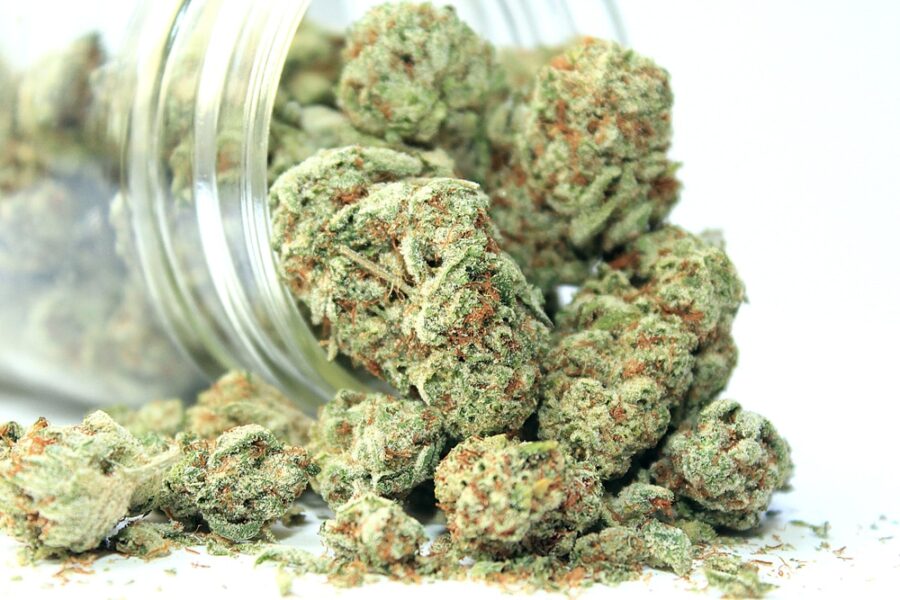
Marijuana plants fall into two broad categories: indica and sativa. The former typically grows short and bushy, while the latter is tall and lanky.
Breeders create hybrid strains with borrowed genetics from the two classifications. Which one is best for treating sleeping disorders?
Sativa-dominant weed usually delivers uplifting and energizing effects, while indica strains cause a body high that promotes relaxation and sedation.
Hybrid strains may promote sleep since they pack balanced characteristics from their indica and sativa parents. The cultivar’s terpene profile is also an essential factor to consider while searching for the best weed to reduce insomnia.
Terpenes are natural compounds that give marijuana its unique flavors and aromas. They also have varying benefits. Myrcene causes sedation, while caryophyllene and pinene may reduce stress, anxiety, and pain. These effects make them ideal for helping to reduce sleep disorders.
Consider selecting strains with moderate THC levels since it’s responsible for the potent sedative effects. Avoid high amounts of this psychoactive compound, as it can be overwhelming or cause adverse reactions.
Are you ready to enter the sleepy cannabis world? Here are the five best strains to promote sedation and help you doze off.
1. Granddaddy Purple
Granddaddy Purple is an indica-dominant strain packing up to 23% THC and minimal CBD content. It’s a classic cultivar popular among medical users seeking pain, anxiety, and stress-relieving benefits.
The high THC and indica genetics deliver soothing effects that may aid in combating insomnia and PTSD. It also contains myrcene, giving it mouth-watering berry and grape flavors.
Consume this strain moderately if you’re a beginner or have low THC tolerance. Granddaddy Purple is a highly potent cultivar that can deliver long-lasting effects.
2. 9 Pound Hammer
Are you an experienced weed user searching for a potent sleeping aid? 9 Pound Hammer is an indica-leaning cultivar with a sweet blueberry-like flavor to satisfy your taste buds.
This potent strain packs a punch with 23% THC, making it popular among enthusiasts looking for a long-lasting high. 9 Pound Hammer crushes anxiety and depression and leaves you happy and relaxed.
This cultivar has an impressive terpene profile and strong indica properties, making it perfect for people with sleeping challenges. It eases your mind and body, leading to a deep slumber that lasts for hours.
3. Northern Lights
If you like skunk-flavored marijuana with well-balanced effects, Northern Lights is the right strain. Light the buds and enjoy spicy and pine scents with notes of musk and earthy taste.
Northern Lights is 90% indica and contains 18% THC content. It’s popular among medical users who praise its potential to relieve pain, stress, and depression.
This strain delivers strong sedative effects that calm your body and promote a good night’s sleep. It offers mental and psychical relaxation and can improve your moods and creativity.
4. Wedding Cake
As the name suggests, Wedding Cake is a sweet-flavored strain boasting a lemony and vanilla taste with woody undertones. Besides the mouth-watering aroma, this cultivar has an impressive 20% THC.
The indica-dominant strain delivers a calming and relaxing sensation to unwind from a busy day. It kicks out stress, creating room for euphoria and peaceful vibes.
Wedding Cake may also reduce pain, muscle aches, and inflammation. Once these conditions are out, your body relaxes and gets ready for a peaceful sleep.
5. Bubba Kush
Try Bubba Kush if you want full-body relaxation without overwhelming effects. It packs moderate THC levels at 19% and minimal CBD.
This potent strain is ideal for people seeking a solution to chronic pain or anxiety. Bubba Kush’s indica properties calm your body and induce a sleepy relaxation.
Enjoy the uplifting and euphoric sensations that kick out stress and negative thoughts. The strain delivers sedative effects that may help beat insomnia and promote a deep slumber.
Weed and melatonin: Benefits and risks
Can mixing weed and melatonin help you sleep better? These two substances may improve the quality and duration of your slumber.
Is it safe to use them together? Let’s look at how weed and melatonin interact and the best way to reap their benefits.
What to know when mixing melatonin and weed
Cannabis and melatonin supplements are safe for human consumption but require a thought-out approach to avoid potential side effects. Before mixing them, research or talk to your doctor to determine the best approach.
When using melatonin and weed simultaneously, consuming them consistently at similar intervals is best. This approach triggers your body to shift the circadian rhythm and determine when to doze off or wake up.
Overconsumption of marijuana or melatonin can cause side effects. Avoid them by starting with minimal amounts to help you determine the right dosage for a peaceful rest.
Use these substances sparingly, as consuming them for extended periods can cause addiction or dependency. Your body may also build high tolerance, forcing you to take large doses to achieve your desired results.
Take frequent tolerance breaks to prevent your body from depending on secondary substances to produce melatonin naturally.
Benefits of using weed and melatonin
There’s limited research to prove whether melatonin and weed reactions benefit people with sleeping disorders. Some studies suggest mixing the two substances can help users doze off faster and longer.
Another potential benefit is that marijuana can increase the natural production of the melatonin hormone. This process helps you achieve your desired effects without consuming too many sleeping supplements.
Cannabis may promote longer resting periods and reduce REM time, while melatonin typically causes vivid dreams.
Consuming the two substances can help you achieve better sleep quality characterized by memorable dreams and deep slumber.
Can you smoke weed and take melatonin?

Although you can smoke weed and take melatonin, it may not be the best consumption method.
Marijuana and melatonin cause sedation. Smoking a joint and then taking the supplement may lead to undesirable sluggishness. It’s best to avoid lighting a blunt and taking melatonin, since limited studies support their effectiveness and safety.
Since weed can promote sedation and natural melatonin production, taking the supplement after smoking might be unnecessary.
Some vendors make edibles containing melatonin and marijuana, offering enthusiasts a fantastic consumption method. The effects can kick in after 90 minutes, but some potent products act within 20–40 minutes.
Edibles are convenient; take them about one hour before bedtime and continue your evening routine. Wait for the effects to kick in and enjoy a peaceful good night’s sleep that lasts until morning without re-dosing.
Potential risks of mixing weed and melatonin
Though some studies suggest that taking cannabis and melatonin is safe, others outline several potential risks.
The main one is the likelihood of overdosing on either substance. Excessive weed intake may cause panic attacks, anxiety, and other undesirable effects. Taking high amounts of melatonin supplements may also result in adverse reactions.
Mixing weed and melatonin can also impair your motor skills, making it challenging to accomplish your daily tasks. The mixture may cause high sedation and lethargy, reducing alertness and altering moods.
Over-relying on sleeping aids like melatonin and cannabis can negatively impact your feelings or cause depression. It may affect your normal functioning and productivity at work, since you might wake up lethargic.
Consider these potential risks before combining marijuana and melatonin. In case of any queries, seek advice from a professional medical practitioner.
Side effects of mixing melatonin and weed
Combining different substances usually results in mild side effects in low doses and adverse ones with higher consumption.
Mixing melatonin and marijuana is no exemption. Here are several unwanted reactions that might result from the combination:
- Dry mouth
- Excessive dizziness
- Respiratory issues like shortness of breath
- Rapid heart rate
- Seizure
- Reduced awareness of your surroundings
- Nausea and vomiting
The tolerance levels of the melatonin and weed reaction vary between users. It’s challenging to determine this combination’s impact on consumers.
Since both supplements influence dopamine levels, using them may cause mental and physical discomfort. Seek medical advice if you experience adverse effects after consuming weed and melatonin.
Sleep better with melatonin and weed
High-quality sleep for about eight hours daily is essential to maintain a healthy work-life balance. Various factors, like stress and pain, can make it challenging to achieve a peaceful slumber.
Melatonin supplements and weed are among the best natural remedies to help you sleep better and longer. Use these two safe substances moderately to get high-quality rest without experiencing adverse reactions.
Are you looking for the most potent cannabis to get you into the dreamland? At The Seed Fair, we have premium CBD cannabis seeds and wellness guides to help you achieve your desired health results.


